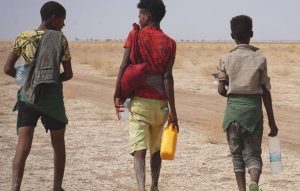Migration here to stay – IOM head
Mass migration is here to stay and the world needs to regularise, make safe and reap the economic benefits of the movement of people.
This is the core message from Amy Pope, the head of the United Nations’ migration agency IOM, in a keynote speech given at a major international conference on migration.
Speaking at the ‘Facilitating Regular Pathways’ event New York, Ms Pope long, dangerous journeys were on the rise but migration was also driving prosperity.
She said migration was on track to become one of the defining features of the 21st century and more action was needed to ensure regular pathways for people to move safely.
Ms Pope said she hoped that participants will help deliver prosperity, benefits and innovations for migrants and for their countries of origin and destination.
 About 281 million people worldwide are one the move, representing around 3.6 per cent of the global population, according to a recent IOM report.
About 281 million people worldwide are one the move, representing around 3.6 per cent of the global population, according to a recent IOM report.
This is up from 153 million in 1990, and more than triple the 84 million in 1970. Global trends point to more migration in the future.
“More people are fleeing war or fleeing violence. More people are fleeing economic hardship, or lack of opportunity. More people are fleeing the impacts of climate change, or food scarcity. And increasingly, people are fleeing a combination of all of the above,” Ms. Pope said.
She said migrants were particularly vulnerable to exploitation, violence, abuse and discrimination, she continued. This is especially the case in the context of irregular migration, with desperate people making long, dangerous journeys in the search for a better future.
At the same time, Ms Pope said, migration is one of the most crucial drivers of economic resilience, growth and prosperity.
“Migration is even recognised in the 2030 Agenda for Sustainable Development as a catalyst for a more just and equitable future for all people and the planet,” Ms Pope said.
She said orderly migration could deliver economic benefits.
“Obviously, it brings benefits in terms of economic prosperity. But it also leads to the exchange of skills, to the strengthening of the labour force, to investment and cultural diversity. It also brings some really good food, if we’re honest,” Ms Pope said.
She said it was clear migrants improve their lives through migrating.
And the money they send home increased by a staggering 650 per cent during the period from 2000 to 2022, rising from $US128 billion to $US831 billion.
Most of the remittances, $647 billion, were sent to low and middle-income countries, constituting a significant portion of their Gross Domestic Product (GDP) and surpassing foreign direct investment.
Ms Pope also called for investments in migration, saying any talk about investment must also include investment in people and in migration to protect the human rights and dignity of migrants.
“And the way to do that is by building safe and regular pathways for migration ensuring that they are able to access essential services and are not fodder for exploitation in the countries where they’re going to work,” she said.
The event heard that controversy and misinformation were sullying debates on migration.
“The issue of regular pathways has become a controversial topic in some regions due to the political atmosphere surrounding migration and the proliferation of toxic misinformation campaigns,” Ms Pope said.
“Instead of putting regular pathways in place to boost labour forces, to better integrate migrants in host communities, and to make migration safer for all people on the move, policymakers are encouraged to treat migration as a problem; to believe that irregular migration represents the majority of migration, and to focus solely on the crisis dimensions,” she said.
The Global Compact for migration, adopted by UN Member States in 2018, represents a commitment “to ensure that policymaking and cooperation around migration is not dictated by falsehoods and such skewed perspectives, but by facts, by common sense, and by taking a 360-degree approach to migration, including through regular pathways”.
The event heard that half of the world’s population is below the age of 30. At 1.8 billion strong, they represent the largest generation of young people in history, overwhelmingly live in developing countries, and account for just under a third of all migrants.
“Harnessing the potential of young migrants is pivotal to unlocking human mobility’s contribution to development. Young migrants’ experience, aspirations and contributions are integral to shaping a better future for all,” Ms Pope said.
Read more here: Long, dangerous journeys on the rise but migration drives prosperity | UN News












